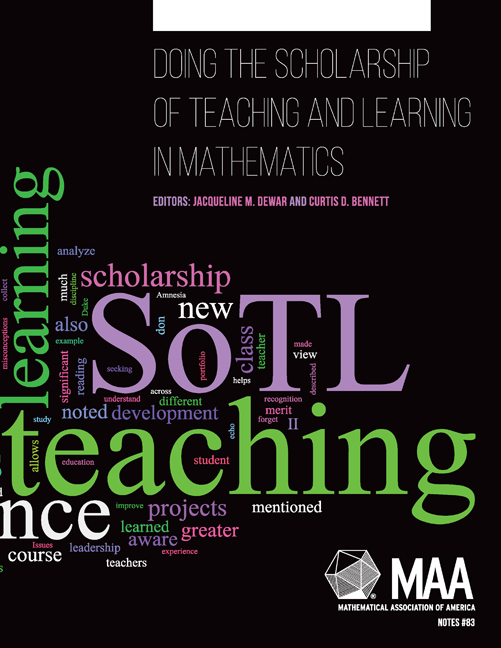7 - A Quantitative and Qualitative Comparison of Homework Structures in a Multivariable Calculus Class
from Theme 1: - Experiments with Approaches to Teaching
Summary
Editors' Commentary
This chapter describes the work of an interdisciplinary team, Lynn Gieger (Mathematics Education), John Nardo (Mathematics and Computer Science), Karen Schmeichel (Biology), and Leah Zinner (Psychology), to improve the effectiveness of homework in a multivariate calculus class by using an online homework system. Although at the beginning of the investigation, the majority of the team members were not very familiar with qualitative methods, they found the qualitative data particularly useful for providing context and depth to the mixed quantitative results they obtained. Their study highlights the merit of a mixed method approach, particularly when statistically significant results are not obtained from quantitative data. The authors also testify to the value they found in working collaboratively with colleagues from other disciplines.
Introduction
A conference workshop on SoTL inspired four novices from diverse disciplines (mathematics, education, biology, and psychology) to bring research tools to bear on pedagogical issues. This chapter demonstrates how to start a SoTL project even if the investigator is not fully trained in SoTL methods.
Our calculus sequence serves many purposes. It is both a service we provide to other client disciplines, and also a pipeline into our major that we must nurture. Because Oglethorpe University is a small (approximately 825 undergraduates), private, selective liberal arts college, it has traditionally had only one section of calculus students per academic year. One of the authors, John Nardo, has taught the calculus sequence every other year for the last 12 years. Like many mathematics faculty, he was concerned with his students' entry-level skills and the amount of practice they devoted to mastering new skills. He believed that the structure of homework assignments might have an impact. In broad terms, he wondered how to make “homework,” i.e., the practice taking place outside of class, truly effective. Were there better ways, perhaps taking advantage of recently developed learning tools, to encourage practice and mastery?
These questions were on Nardo's mind in the summer of 2010 when several Oglethorpe faculty members attended the 2010 SENCER (Science Education for New Civic Engagements and Responsibilities) Summer Institute.
Information
- Type
- Chapter
- Information
- Publisher: Mathematical Association of AmericaPrint publication year: 2014
Accessibility standard: Unknown
- 1
- Cited by
